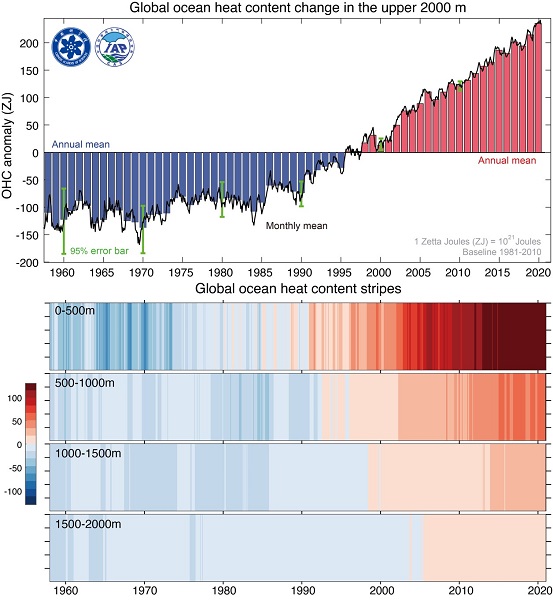Upper ocean temperatures hit record high in 2020

Fig. 1. (upper) Global upper 2000 m OHC from 1958 through 2020. The histogram presents annual anomalies relative to a 1981–2010 baseline, with positive anomalies shown as red bars and negative anomalies as blue. (bottom) Global 0-500 m, 500-1000 m, 1000-1500 m, and 1500-2000 m Ocean Heat Content (OHC) stripes from 1958 to 2020. Units: Zettajoules (ZJ).
Even with the COVID-19-related small dip in global carbon emissions due to limited travel and other activities, the ocean temperatures continued a trend of breaking records in 2020. A new study, authored by 20 scientists from 14 institutes around the world, reported the highest ocean temperatures since 1955 from surface level to a depth of 2,000 meters.
The report was published on January 13 in Advances in Atmospheric Sciences and concluded with a plea to the policymakers and others to consider the lasting damage warmer oceans can cause as they attempt to mitigate the effects of climate change.
Using a method developed at IAP/CAS, the researchers calculated the ocean temperatures and salinity of the oceans down to 2,000 meters with data taking from all available observation from various measurement devices from the World Ocean Database, which is overseen by the National Oceanic Atmospheric Administration and the National Center for Environmental Information.
The authors found that, in 2020, the upper 2,000 meters of the world's oceans stored 20 more Zettajoules heat than in 2019 (Figure 1). And they reported other effects, such as ocean salinity pattern amplification and more stratification due to the upper layer warming quicker than the deeper sections. Both changes could cause harm to ocean ecosystems. In addition, warmer oceans and a warmer atmosphere also promote more intense rainfalls in all storms, and especially hurricanes, increasing the risk of flooding. However, due to the ocean's delayed response to global warming, the trends of ocean change will persist at least for several decades.
According to Dr. CHENG Lijing, paper lead author and member of the CLIVAR Global Synthesis and Observations Panel, "As more countries pledge to achieve 'carbon neutrality' or 'zero carbon' in the coming decades, special attention should be paid to the ocean - Any activities or agreements to address global warming must be coupled with the understanding that the ocean has already absorbed an immense amount of heat and will continue to absorb excess energy in the Earth's system until atmospheric carbon levels are significantly lowered."
************************************************
This work was supported by National Key Research & Development Program of China, the Strategic Priority Research Program of the Chinese Academy of Sciences, the Key Deployment Project of Centre for Ocean Mega-Research of Science, the U.S. National Science Foundation and the U.S. National Aeronautics and Space Administration.
Citation: Cheng, L.J., J. Abraham, K.E. Trenberth, J. Fasullo, ..., J. Zhu, (2021): Upper ocean temperatures hit record high in 2020. Adv. Atmos. Sci., https://doi.org/10.1007/s00376-021-0447-x.











Add new comment